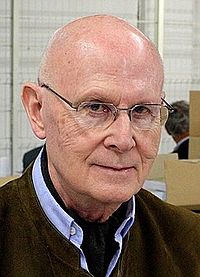Dominique Venner facts for kids
Quick facts for kids
Dominique Venner
|
|
|---|---|
 |
|
| Born | 16 April 1935 Paris, France |
| Died | 21 May 2013 (aged 78) Paris, France |
| Occupation | Writer, historian, editor, soldier, activist |
| Genre | Non-fiction (History) |
| Notable works | Le Cœur rebelle, Baltikum: dans le Reich de la défaite, le combat des corps-francs, 1918-1923, Histoire et Tradition des Européens: 30000 ans d'identité, Ernst Jünger: Un autre destin européen |
| Notable awards | Broquette Gonin Price, 1981 (issued by the Académie française) |
Dominique Venner (16 April 1935 – 21 May 2013) was a French historian, journalist, and writer. He was involved in political groups in his youth. Later, he left politics to focus on being a historian. He was known for studying military and political history. At the time of his death, he edited a history magazine called La Nouvelle Revue d'Histoire.
Early Life and Military Service
Dominique Venner was born in Paris, France. His father was an architect and was involved in politics. When he was young, Venner volunteered to fight in the Algerian War. He served in the military until October 1956.
After returning to France, he joined a movement called Jeune Nation (Young Nation). He also took part in a protest at the office of the French Communist Party in November 1956. He helped start a group called Parti Nationaliste (Nationalist Party). He was also part of the Mouvement populaire du 13-mai.
Venner was a member of the Organisation armée secrète, a political group. Because of his political activities, he was imprisoned for 18 months. He was released from La Santé Prison in 1962.
Political Ideas and Groups
After leaving prison in 1962, Venner wrote an important text called Pour une critique positive. In this writing, he looked at why a political effort had failed. He suggested creating a strong, organized group of young, dedicated people. This text became very important for some right-wing political movements.
In 1963, he started a movement and a magazine called Europe-Action with Alain de Benoist. He also founded Éditions Saint-Just, a publishing house. These groups brought together nationalists and people interested in European ideas.
Venner was also a member of the Groupement de recherche et d'études pour la civilisation européenne (GRECE). This was a research group focused on European culture. He also helped create the Institut d'études occidentales (IEO) in 1970. This institute was against communism and supported Western values. In 1971, Venner stopped his political activities to focus on his career as a historian.
Career as a Historian
Dominique Venner became a well-known historian. He specialized in topics like weaponry and hunting, writing several books about them. He also wrote many important history books. Some of his main works include Baltikum (1974) and Le Cœur rebelle (The Rebel Heart) (1994).
His book Histoire de l'Armée rouge (History of the Red Army) won an award in 1981. It was the Prix Broquette-Gonin for history, given by the Académie française.
In 1995, Venner published Histoire critique de la Résistance. This book looked at the role of French nationalists in the Resistance movement during World War II. In 2002, he wrote Histoire et tradition des Européens. In this book, he explored what he believed were the shared cultural foundations of European civilization. He also presented his idea of "traditionalism." This concept looks at the unique features of different societies and cultures.
Venner was the editor-in-chief of a magazine called Enquête sur l'histoire. Later, in 2002, he started La Nouvelle Revue d'Histoire. This was a magazine published every two months and focused on historical topics. Many famous historians and writers contributed to it. Venner also co-hosted a radio show on Radio Courtoisie.
Some of his books have been translated into several languages. These include English, German, Spanish, Portuguese, Italian, Russian, and Ukrainian.
See also
 In Spanish: Dominique Venner para niños
In Spanish: Dominique Venner para niños

